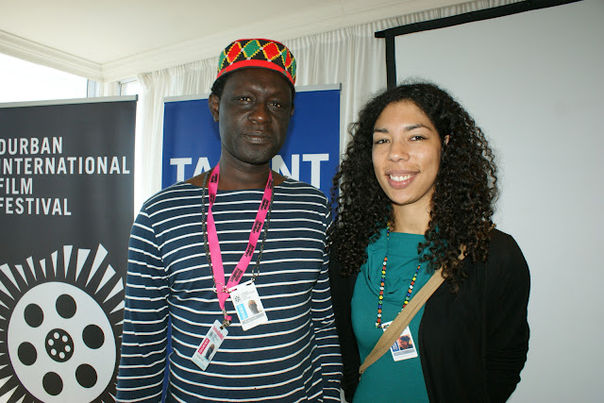Lost in Translation
Talent Press Durban 2012 participant Claire Diao shines a light on the polyinguistic nature of African cinema and the state of its film and festival landscape.

Director Moussa Touré and Talent Press participant Claire Diao
This year, the Durban International Film Festival features a special focus on French cinema with an extensive programme of 14 feature films. Yamina Benguigui, French-Algerian film director and a delegate of the French Foreign Affairs Ministry, was at the festival to introduce Michael Haneke's LOVE, this year’s winner of the Cannes Film Festival's Palme d'Or.
From movies to people, the French-speaking network had a large presence at this year's festival. As part of 2012's Talent Campus Durban, six French-speaking countries were represented: Algeria, Burkina Faso, Morocco, Rwanda, Senegal and Tunisia - proof that a love of film can transcend the language barrier.
For years, African cinema has been divided by the languages imposed on African countries by their former colonisers. For example, Francophone Senegalese film influenced Burkinabè cinemas, while English-language Nigerian cinema influenced South African film. Film festivals attempted to screen movies from different parts of the continent, but limited access to subtitled copies of the films made it a difficult task.
Burkina Faso holds one of the oldest film festivals in Africa, the Fespaco, which started in 1969. African cinema lovers from around the world to come to experience this massive 10-day event, which is so popular that people sit in the aisles to watch the movies. But despite being such an established festival, it would seem that many filmgoers are unaware of its existence. After the screening of Moussa Touré's THE PIROGUE, one woman commented that she attends the Durban International Film Festival because it provides a unique opportunity to watch African films.
It's a sad state of affairs when people don't have access to films that represent their own culture. Even where there is the desire to watch different content, audiences are passive, waiting for their governments, TV programmers or festival directors to change the situation.
Africans must stand up without waiting for foreign help. Audiences need to watch their own stories. With three movies coming from Francophone Africa, this year's DIFF selection has shown festival-goers that talented filmmakers are emerging from every side of the continent. "We have to fight", said Moussa Touré. According to Touré, French and English-speaking Africans must start the fight today instead of tomorrow.

